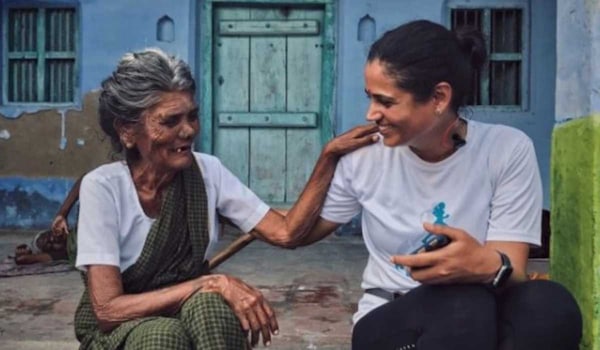Women of My Billion review - Srishti Bakshi-led documentary shines a light on inequality
Women of My Billion, presented by Priyanka Chopra Jonas, redefines hope in the face of adversity.

Last Updated: 09.38 AM, May 03, 2024
The powerful documentary Women of My Billion, or WOMB, highlights the dreams, ambitions, and resiliency of Indian women who have banded together to combat sexism and violence. Srishti's 240-day, 3,800-kilometre journey from Kanyakumari to Kashmir sheds light on the pressing importance of recognising, empowering, and protecting the world's one billion female citizens.
The one-hour, 37-minute documentary begins with Srishti witnessing a woman's abuse by her husband. She enters the dark room and sees a woman bleeding profusely with her saree torn, and her husband blames her for her "anger" issues in no time. Despite her tears and breathlessness, her husband remains unfazed, and, feeling a twinge of fear upon his discovery, he justifies his actions.
This is an example from a tiny house in a corner of India, but it illustrates the harsh reality of households, regardless of their strength. Men have a sense of entitlement and often hold women in low regard, a situation that has persisted for centuries.
Women of My Billion is a documentary that Srishti Bakshi took charge of after reading the news about the Bulandshahr gang rape in 2016. The Highway 91 rape case, in which a gang raped a mother and a 14-year-old daughter, once again shook the nation and raised questions about women's safety in this country.
Srishti decides to walk from Kanyakumari to Kashmir while also visiting places, meeting women in workshops, and learning about the crimes against them. With each kilometre she travels, she learns about the abuse women endure and how many men justify it.
A schoolboy laughs in one of the workshops, unapologetically telling her that girls should cover their bodies instead of wearing short skirts and jeans. An old man echos the same words, emphasising that women should refrain from provoking men by roaming the streets after a certain time or wearing specific clothing. This mirrored the fact that education has nothing to do with how men look at women; it's always the upbringing of what happens behind closed doors.
A few days ago, I spoke to a couple of my friends about how women should be financially independent, no matter what. Srishti says the same thing: It's what gives men the upper hand when women depend on them, eventually making them feel like a liability.
In the documentary, apart from Srishti's walk across the country, we see three highly educated women from different parts of the country and strata and how they became survivors of abuse. One of them, a survivor of an acid attack, endured harsh treatment for refusing a man's marriage proposal. The other woman got married at a young age, and her husband and his family subjected her to body shaming and abuse, to the point where they allegedly informed her that her father-in-law would determine her lingerie choices and even compelled her to undergo breast reduction surgery. The third woman, a doctor, lost her husband to suicide at a young age, and her second husband, also a doctor, sexually assaulted her, mistreated her, and suspected her of having an affair.
With every minute passing and every kilometre covered, the documentary takes a darker turn and takes you in without realising how the surroundings are unsafe. Many refuse to understand that society doesn't make people; individuals make them. This leads to the gender divide, which has become so prominent that keeping hope feels delusional, but that's the way to live in this world.
Not only does Srishti's body hurt from all the walking, but her mind also gets tired from hearing all the sad stories she hears. Specifically, two men brutally rape the fourth daughter, the youngest in the family, and then murder her. The mother laments her inability to bear a son, which serves as a sobering reminder of the cultural pressure to have more children until a baby boy is born.
We hear Srishti stating that dowry pressure drives poorer families' desire for a son. However, in the same documentary, Neha, hailing from a different social background, shares her experience of her family facing dowry demands. 'It happens,' many parents and guardians tell their girls, cutting them off from support.
Women of My Billion discusses topics that I believe everyone is aware of, but Srishti's actions have caused many to think about them, and hardly anyone else takes such actions. We hear about the accused and culprits getting away, getting straight into politics after getting out of jail, or having no action taken because of the influential background they come from. Only when such voices emerge can we find the hope we live in, but even then, there's no guarantee of a safety net for women.
It inspires hope to initiate more such discussions, and the time has come to eradicate gender inequality.
A source of strength and inspiration, Women of My Billion tells stories of perseverance and optimism in the face of hardship. In her story, Srishti Bakshi resounds a powerful demand for female equality and the abolition of sexism.
Subscribe to our newsletter for top content, delivered fast.

